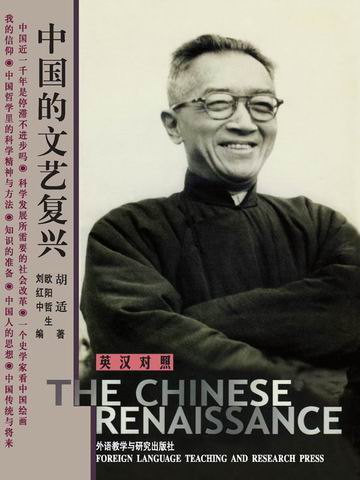沉思既往,检讨得失,字里行间凝结着作者深沉的现实关怀与明睿的学理思考。
1933年7月胡适应邀在美国芝加哥大学比较宗教学系“哈斯克讲座”作题为“中国文化的趋向”的系列演讲,随后芝加哥大学将胡适的演讲结集为《中国的文艺复兴》一书出版。该书内容诚如胡适在前言所说:它“首先是要描述中国文化的某些方面是如何发生变革的;其次,是要解释这些变革怎样采取其特殊的途径与方式”。这本书的出版引起了美国读者的极大兴趣。贝蒂·德鲁里在一篇书评中如是评价道:“他的新书在简短的篇幅中蕴含了广博的内容。他以110页的篇幅提纲挈领地展示了整个中国历史。事实上,它是有关现代中国文化走向的有价值的研究,对国际上了解这一问题将极有助。”
Hu Shih (1891-1962), a leading Chinese educator and scholar who received much of his education in the United States, was an important advocate of liberal political and social views in China during the 1920s and 1930s. A self-proclaimed disciple of John Dewey, under whom he had studied at Columbia, Hu was a tireless critic of intellectual dogmatism and a persistent advocate of "evolutionary" and pragmatic reform. Ultimately his position proved vulnerable to attacks from both the conservative traditionalist and the radical revolutionary extremes. In this elegantly written intellectual biography, Jerome B. Grieder examines the development and expression of Hu Shih's ideas against the background of a deepening revolutionary crisis in China.
- 逻辑与哲学
- 中国近一千年是停滞不进步吗?
- 中国的文艺复兴
- 我的信仰
- 知识的准备
- 民主中国的历史基础
- 一个史学家看中国绘画
- 中国抗战也是要保卫一种生活方式
- 中国人的思想
- 中国哲学里的科学精神与方法
- 中国传统与将来
- 科学发展所需要的社会改革
- 版权页
- Logic and Philosophy
- Has China Remained Stationary During the Last Thousand Years?
- The Chinese Renaissance
- My Credo and Its Evolution
- Intellectual Preparedness
- Historical Foundations for a Democratic China
- A Historian Looks at Chinese Painting
- China, too, is Fighting to Defend a Way of Life
- Chinese Thought
- The Scientific Spirit and Method in Chinese Philosophy
- The Chinese Tradition and the Future
- Social Changes and Sicence
- Copyright Page























 京公网安备 11010802032529号
京公网安备 11010802032529号
笔记加载中...